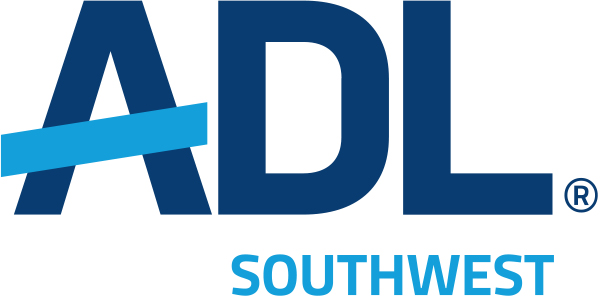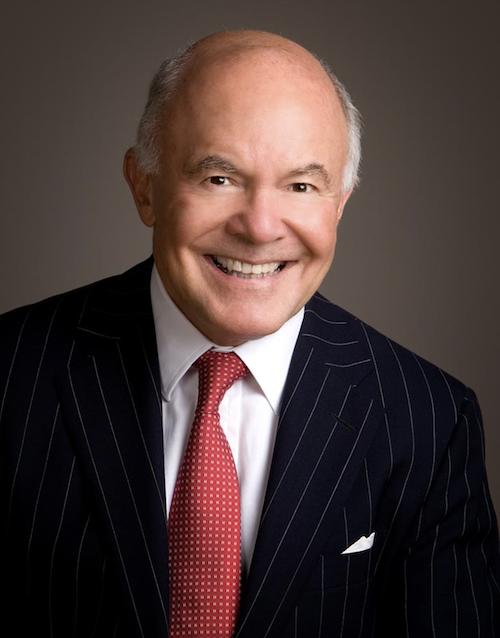George Stark has been a distinguished member of ADL’s board and a dedicated donor to ADL for many years. We asked him to tell us about himself, because we figured there was a lot about him we didn’t know, and boy, was there! This is just part of George’s story, as told to us by him.
I was born in 1944 in Havana, Cuba to Austrian parents originally from Vienna, Austria. They fled before the German occupation of Austria to Brussels, Belgium where they stayed for a while until the Germans invaded Belgium. The pressure to arrest and persecute jews caused them to flee through occupied France, into Spain. They ended up in the city of Bilbao where through the help of righteous Christians and the Cuban Consul in Bilbao, they were able to buy passage on a Spanish freighter headed to Havana, Cuba in 1939. They landed with visas issued by the Cuban consul which stated that they were of Austrian origin but returning to Cuba where they were born to European parents in Havana. The Cuban authorities had seen similar visas from other passengers coming from Spain, and interned them in a refugee camp in the outskirts of Havana.
To their good fortune a member of the Jewish community doing charitable work came to the camp, and he agreed to help them out and loaned them the funds to be able to get re-settled in Havana. The congregation that he represented in Havana helped them get an apartment. With the help of a fellow Viennese Jeweler, who by coincidence was on the same ship from Bilbao with my parents they started a jewelry business.
My father and his partner manufactured the jewelry manually and put it together in their modest apartments. My mother designed the pieces for them. When the war was over and they could have applied for visas to leave Cuba for the United States, like many other European refugees immediately did, my parents and his partner opted to stay and continue to build their successful little store that was prospering nicely after the war was over.
My mother and father were observant Jews and we attended Sabbath services regularly at our congregation in Havana. My mother was active in the sisterhood and did a lot of charitable work with her fellow congregants. They also helped to provide services and funding for Jewish refugees that had arrived in Cuba with no means to support themselves.
My mother was raised by her widowed mother in Vienna. She was sent to camp every summer with other girls from the Jewish community. She learned a lot from the camp counselors ad became very interested in the concept of a Jewish homeland and the potential some day of a Jewish State. In her teens she met Jewish authors that came to lecture in Vienna, and was ideologically and firmly committed to our religion.
She passed on those values to me from the time I was a youth growing up in Cuba. I became active in our temple’s youth group and ultimately became president of the youth group after my bar mitzvah.
Life in Havana, Cuba was very pleasant and low key. I attended an American School and was educated in Spanish and English so that we were all fluent in both languages. My parents always spoke German at home and while I learned the language, I wanted to be like the rest of the friends in my school and chose not to speak German. So my parents at home would speak to me in German every day routinely, and I would always answer them, or address them in Spanish.
They also believed that all educated and well-rounded persons spoke French, as they had learned at school in Vienna. When I was about ten years old they engaged the services of a private French teacher who would come to our home twice a week (after I returned from school with plenty of homework). I so dreaded the routine that I would escape from the building, and disappear when I looked out the window and saw the teacher coming in the distance. My mother made me pay out of my allowance for the lessons missed, which ultimately made me take the lessons because I could not afford to do that and be totally broke! The good fortune, as time would later tell, was that when my parents decided to leave for Paris, France a few years later, after Fidel Castro came to power, I was fluent in French, and getting along with my classmates in our new home in Paris was not a problem for me.
My father’s jewelry business in Havana prospered over the twenty plus years. He had a close working relationship with an American jeweler in NY who had access to precious stones directly from DeBeers, the internationally known members of the syndicate in London and South Africa. During the last years of the Batista dictatorship he was able to impress upon his clients the importance of having large diamonds and colored stones to be able to hide in your belongings, and take them with you if you had to flee the country someday.
I still remember the day when he informed me that he felt that he did not trust the Castro regime, and that he thought the time had come to prepare to leave the country.
By the end of the 1960 school year my father had decided to accept a position with his good friend Harry Winston to open offices for the firm in Paris, France. I then was enrolled for my senior year of high school at the American School of Paris and had an incredibly illuminating, highly productive academic year. That was followed by an early acceptance to Cornell University in Ithaca, NY.
Four years at Cornell opened my eyes to the multiple opportunities that a good business and finance background could provide. I majored in accounting & finance, and took all the required courses in food chemistry, haute cuisine, hotel development, real estate, and construction.
Cornell had a very big fraternity social scene on campus. A that time in 1962-1964, there were approximately 52 fraternities on campus. Most of them had parties at least twice per month with live music. There was great demand for rock and roll bands.
To my parents’ great dissatisfaction, I put away my flamenco classical guitar training, which they had arranged for me in Havana, and started playing electric guitar, a gift from my uncle in NYC. Over the four years I started various rock bands and bought an electric base from a young man who was leaving town to join the navy. He gave me a few lessons before leaving Ithaca.
The rock and roll business became a big business for me while I was a student in college. I ended up managing other bands besides mine, and ultimately sold my band to my fellow musicians when I graduated. When I left Ithaca and Cornell, I put down my guitars and decided it was time to move on to the “real world”.
After finishing 4 years at Cornell, I was accepted at a relatively new MBA program in Fontainebleau, France (just an hour outside of Paris). called INSEAD The European Institute of Business Administration. You had to be perfectly fluent in the three major languages: English, French and German. The fact that I was also fluent in Italian (studied at Cornell), and Spanish did not count for this program. They offered a six-week accelerated program for those who were weak in German in Berlin before the regular school year began in August. You had to pass the proficiency exam before school started, or you could not enroll in the program for the school year. I spent 6 weeks in Berlin studying German and met fellow students from various countries who would then move to Fontainebleau.
I was hired after graduation from INSEAD to move to New York City for an indefinite period to be trained for the Investment Banking Industry in the International Department of White Weld & Co. in NY starting in September of 1967. The firm would decide where they could best use my services. I travelled extensively to South America, Central America and Europe.
One day I got a call from a lovely young woman who said she wanted to fix me up with a gal who had just moved to New York City from Washington, D.C., where she had spent several years with NBC as a researcher and associate producer of documentary films. That lady, Lois Farfel Stark, became my wife and mother of my children, and we have been married for 52 years.
In 1974 after living in NYC together, my firm asked me to transfer to their newly-acquired Houston office. They assured me that if I wanted to return to my job in New York after we turned around the business in Houston that I could come back. Houston is a welcoming, friendly place and we felt very much at home and have been here ever since. We raised two wonderful young men, Ben and Daniel (who sadly passed away at age 21 from cancer). Ben married Nikki, a lovely gal, and they have now have two daughters, Amelia and Mila (ages 2 ½ & 11 months) living in Austin, TX.
I went to work helping to build the Houston office, I established an institutional business for the firm, and ultimately became the regional manager for the Southwest Region. Then I received an offer to open an office for a firm called Drexel Burnham, which was relatively unknown at the time. I worked very hard for the next few years building up the firm, hiring brokers, and managing our clients’ assets. Drexel grew dramatically after a couple of years as the high-yield bond business developed into a very lucrative field. That success ultimately caused the firm serious, terminal legal problems, which ultimately, sadly caused the firm to fail.
The Burnham family, who had founded the original firm, were no longer in senior management, and I.W Burnham wanted to create a new firm for his son, Jon, and his children, and invited me to become a director and Board member, and build a Houston presence for Burnham Securities, which I accepted in 1989. I accepted a position on the Board of Directors of Burnham Securities and stayed there for a few more years until I chose to leave the firm and start my own investment management and brokerage firm called Stark Capital Management.
I had outside civic activities in Houston in Houston for many years. I served on numerous boards, including United Way of Greater Houston, Jewish Family Service, the Houston Ballet, St. John’s School, and the Menil Foundation.
One of my serious passions within the civic work that I always tried to maintain in the community was the work of the Anti-Defamation League. I greatly admired and became a very close friend of the director of the agency in Houston, Tom Neuman.
I joined the board in 1976 and have been fortunate to have been actively involved in various capacities serving the ADL both in Houston as well as in New York City. I chaired the board of the Southwest Region. In New York I served as National Budget Chair of the League for a few years, and as Chair of the Investment Committee of the ADL Endowment for over 15 years.
My commitment to fighting antisemitism was passed on to me by my parents, and I have never wavered. I am still on the board of ADL and serve on several committees.


